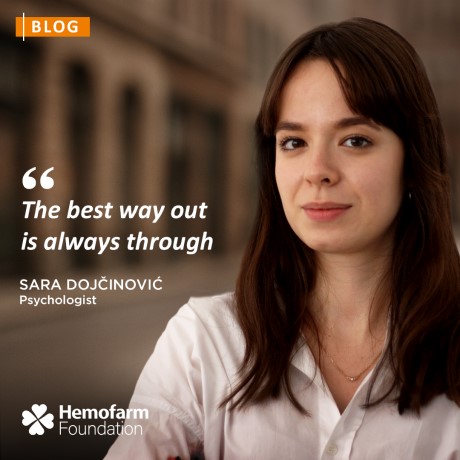
10/04/2025
How to “Survive” the Emotional Roller Coaster?
Sara Dojčinović
research intern at the Department of Psychology, Faculty of Philosophy, University of Belgrade, and psychologist at the Psychosocial Innovation Network – PIN
How to “Survive” the Emotional Roller Coaster?
From euphoria to sadness, from fear or calmness to intense anger—when we experience emotions that shift rapidly like scenes in an action movie, often without clear reasons or warnings, life can feel like a true emotional roller coaster. Similar to a ride at an amusement park, this roller coaster through emotions seems beyond our control—sometimes we are in a slow, yet steep ascent, then gradually pass through level stretches, and at other times we race downward at high speed. And all of this happens in a short period of time.
If we refer to the well-known lines of poet Robert Frost, the best way out of difficult situations is to go through them (The best way out is always through). Life confronts us daily with uncertainty, loss, challenges, and change—perhaps now more than ever, in the context of the instability of sociopolitical situations and widespread anomie. From a psychological perspective, our emotional system reacts to external events (e.g., frequent media and social media use trigger these reactions) but also to our own internal conflicts (e.g., when we ourselves don’t know what we think or want), which can easily lead us to feelings of exhaustion, confusion, and loss of control. In such moments, it's important to remember that sometimes we simply need to ride through the experience, but also that the emotional roller coaster is not quite the same as the real thing—there are some brakes we can apply.
What protection mechanisms are available to us?
In moments of emotional acceleration, there are various stress-coping methods available to us, some of which represent good psychological protection mechanisms. For example, a change in perspective or reframing, which we can think of as changing the angle from which we view a picture, can help us see the same situation in a new light, thereby altering the way we experience it and the emotions we feel (e.g., we may no longer feel anger but sadness when we understand someone's behavior towards us). On the other hand, what often happens and does not represent a helpful protection mechanism but rather one that can worsen the situation is avoidance (consciously or unconsciously avoiding situations), such as postponing a visit to the doctor out of fear of what they might tell us, or mental disengagement (e.g., distancing ourselves from the situation by focusing on other activities or thoughts—playing games, watching shows, or burying ourselves in work). These mechanisms may provide short-term relief, but in the long run, they can lead to internal tension and worsen psychological and somatic issues.
To better understand how we can help ourselves cope with the situation we're in, it's important to recognize where we can apply the brakes, i.e., what is under our control and what is not. For example, is it truly necessary for us to follow the media every day? Is there space to reduce stress or take a break—even if it’s just taking one day off? What brings us relief daily (e.g., drinking coffee, going to the gym, spending time with a pet), and can we do more of it? Of course, the roller coaster will likely still take us through emotional ups and downs, but when we take steps over which we have some control, there is a good chance we can at least slow it down until we are able to stop it.
How to manage different emotions and maintain physical and mental health?
Until we completely descend from the emotional roller coaster, it would be helpful to find a way to manage our feelings while preserving our psychosomatic health. One way to do this is to truly allow ourselves to feel our emotions rather than suppressing, stifling, or ignoring them. So, when we notice rapid emotional changes, we can try to give ourselves space to simply be with those emotions for a few moments before we attempt to change or "fix" anything. This can help us identify exactly what we are feeling and name it, which is not always easy. For example, we might think we are angry about something happening, only to later realize we were experiencing a deep sense of fear.
Additionally, it’s important to accept our emotions—they are neither good nor bad, we don’t have to love them, nor do we have to let them control our lives; we simply need to accept that we feel a certain way in the given moment. From this place of acceptance, clarity and the next step come more easily, and the roller coaster becomes less frightening. To aid in this process, we can implement daily routines, engage in physical activity, keep a journal, and seek social support—talking to friends, family members, or people with similar experiences can bring relief. When the roller coaster becomes overwhelming and starts interfering with our daily life, the best course of action is to seek professional support.
When to seek professional help? What to do if professional help is not available?
Professional help is important when we notice that emotions are significantly disrupting our daily functioning—when we feel hopeless, exhausted, a sense of loss, or struggle with sleep, eating, and concentration for a long period of time. While psychological support should not be a luxury but a resource available to everyone, this is not always the case. In such instances, we can rely on some of the free resources available for psychological and psychosocial support. Some of these resources are listed below. Finally, it’s important to remember no one must or should know everything or can manage everything alone. Mutual support and solidarity are our collective strength, and we should seek help when we need it.
Free Resources
If you urgently need help, especially if you feel life has lost its meaning or are thinking of harming yourself, please call:
Centar Srce – Support for people in crisis and suicide prevention 0800 300 303 | vanja@centarsrce.org (working hours: 14:00-23:00)
Laza Lazarević Clinic – National Suicide Prevention Helpline 0800 309 309 (option 1, available 00-24h)
NADEL – National Children's Line 116 111 (0-24h) | 116111.rs (chat support: 18:00-22:00)
CEZAM – Counseling center for children and youth (10-30 years of age), weekdays 12:00-20:00 +381 69 28 23 004 | cezam.rs
Psychological support for students (online counseling), every day 10:00-22:00 psiholoskapodrskastudentima@gmail.com
NADEL – Parenting advisory line 0800 007 000 (16:00-22:00) | 116111.rs
MamaSOS – Support line for mothers 060 339 3390 (weekdays 09:00-15:00)
Many health centers in Serbia offer psychological services, so you can contact your general practitioner who will refer you to psychological support and counseling or a psychiatric consultation.
Mental health services in the community, in the form of
mental health centers, are available in six cities in Serbia:
Belgrade (Terazije 3, II floor) 011/3612-467, 064/8652-520 (09:00-15:00)
Pančevo (Dimitrija Tucovića 14) 013/302-288 (08:00-15:00)
Kragujevac (Kralja Milutina 1) 034/370-567 ext. 113 (09:00-15:30)
Vršac (Podvršanska 13) 013/834-205 (09:00-13:30)
Kikinda (Save Tekelije 10) 023/050-3450, 062/792-764 (07:30-14:30)
Niš (Radnih Brigada 26) 018/231-134 (08:00-14:00)
Additionally, several municipalities offer counseling and therapy services through the social welfare system, and you can inquire about available support options such as Marriage and Family Counseling, which provides counseling and psychotherapy services for all citizens.
Support Platforms and Networks
Čuvam te – National platform for the prevention of violence - www.cuvamte.gov.rs
Sve je OK! – Resources for mental health and psychological support - www.svejeok.rs
Hej, tu smo! – Support for young people - www.tusmo.info
Sazvežđe podrške – sazvezdjepodrske@opens.rs and a list of organizations within the network offering various types of support - https://opens.rs/sazvezdje-podrske/

AUTHOR
Sara Dojčinović
research intern at the Department of Psychology, Faculty of Philosophy, University of Belgrade, and psychologist at the Psychosocial Innovation Network – PIN